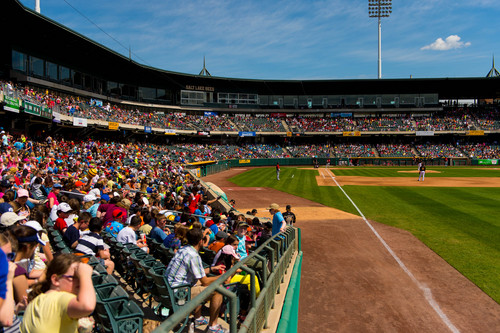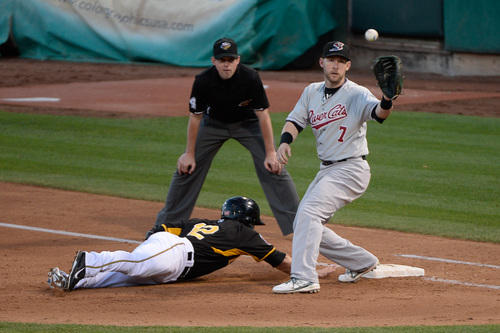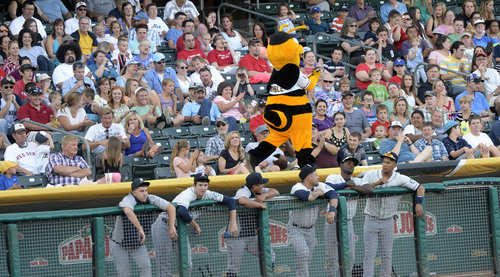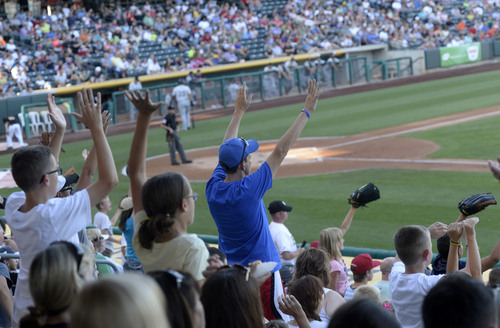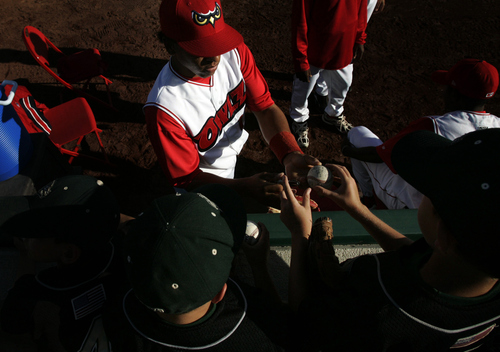This is an archived article that was published on sltrib.com in 2014, and information in the article may be outdated. It is provided only for personal research purposes and may not be reprinted.
The Arkansas Travelers offer bacon cheesecake as a concession-stand specialty and the Lexington Lugnuts prepare a peanut butter and jelly doughnut sandwich.
The Orem Owlz recently staged a Dumb and Dumber World's Most Annoying Sound Noisemaker Giveaway to highlight their promotional calendar.
The Salt Lake Bees and Ogden Raptors draw big crowds to stadiums with the outfields framed by the Wasatch Mountains.
Somewhere, amid the unpretentious charm, clever marketing and refreshing atmosphere of minor league baseball, the players themselves got lost. There's no baseball without them. That's why, regardless of the outcome, a lawsuit with former minor leaguers as plaintiffs vs. Major League Baseball will serve a good purpose of educating fans about the financial reality faced by the performers in these venues.
Something should be done, so that the players you're watching as they launch their careers in Orem and Ogden are not being paid at a poverty-line level. The Triple-A players in Salt Lake City, at the highest level of the minors, also deserve more money than they're earning — if they're not on the parent Los Angeles Angels' 40-man roster.
Ryan Khoury, an infielder from Copper Hills High School and the University of Utah, is among the ex-players recruited as plaintiffs. In his six years in the Boston Red Sox organization, Khoury's highest salary was about $10,000 and he usually lived with other players in a small apartment, according to the lawsuit filed in U.S. District Court in San Francisco.
Another plaintiff, Aaron Meade, was drafted by the Angels and pitched in Orem for parts of two years. He made $3,000 in his first pro season.
The system rewards only the highly drafted players — and, ultimately, those who overcome the staggering odds to reach the big leagues. Zach Sorensen, from Highland High School, received a $450,000 signing bonus as a second-round pick from Wichita State. That money enabled him to tolerate the low salaries in the minors, before and after playing for about 18 weeks with two teams in the majors, where the minimum salary is now $500,000.
By spending more than 43 days in the big leagues, Sorensen qualified for pension benefits. More recently, Salt Lake Bees pitcher Jarrett Grube became eligible for lifetime health care, just by joining the Angels for a weekend.
Those are nice perks. But only a fraction of the 6,000 current minor leaguers will enjoy them.
Sure, they all signed up for this lifestyle. They're willing to endure tough times in pursuit of a dream. It's all part of the business of baseball.
But they deserve better. This problem is not the fault of the minor league franchises, because the players' salaries are paid by the big-league teams.
Major League Baseball's defense is that entertainers are not subject to the federal and state wage and overtime laws of the Fair Labor Standards Act. It does seem silly to argue that professional athletes should be keeping track of their hours on the job. Yet there's no doubt that Double-A players, for example, should make more than the recommended $1,500 per month cited in the lawsuit.
What should fans do about it? Appreciate the players. After all, they're why minor league baseball exists. The food, promotions and beautiful settings are just the backdrop for the production.
Twitter: @tribkurt


